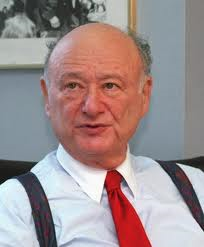 Despite winning both major party nominations — the first New York City mayor to do so — Mayor Ed Koch announced that he would wage a full-scale campaign for re-election against minor-party opposition during this week in 1981.
Despite winning both major party nominations — the first New York City mayor to do so — Mayor Ed Koch announced that he would wage a full-scale campaign for re-election against minor-party opposition during this week in 1981.
Koch, who swept past Brooklyn assemblyman Frank J. Barbaro and 36-year-old Melvin Kerensky — an associate of Lyndon H. La Rouche, Jr. — to win the Democratic primary and trounced state lawmaker John A. Esposito by a two-to-one margin to capture the Republican nomination, said that he would campaign evenings and weekends while relying heavily on television advertising in the general election.
Though facing only minor-party opposition, the 56-year-old Democrat made it clear shortly after winning both major-party nominations that he wasn‘t taking any of his opponents lightly.
“The election will not be taken for granted by me,” said Koch, who had been elected mayor four years earlier by defeating incumbent Mayor Abe Beame, colorful congresswoman Bella Abzug, and Secretary of State Mario Cuomo in a crowded and bitterly contested Democratic primary and runoff before whipping Republican Roy M. Goodman and Cuomo, who was running on the Liberal Party ticket, in the general election.
It had been a particularly brutal and nasty runoff and general election, with thousands of “Cuomo, Not the Homo” signs mysteriously popping up throughout the city.
Cuomo had waged such a spirited campaign on the Liberal Party ticket in 1977 — garnering more than 587,000 votes — that the former five-term congressman realized it would be a mistake to discount any of his minor-party opponents in 1981.
He had to take each of their candidacies seriously.
Facing two of the men he had defeated in the September 10th primary — Frank Barbaro, who remained in the race as the nominee of the newly-created Unity Party, and John Esposito, who captured the Conservative Party nomination — Koch attracted a half-dozen opponents that fall, including Mary T. Codd, a city councilwoman who was running on the Liberal Party ticket.
The Right-to-Life, Libertarian and Socialist Workers parties also placed mayoral candidates in the field.
Much to his credit, Koch debated all six of his opponents that autumn — not once, not twice, but five times. In each of those debates, he found himself the principal target of each of his opponents. Though occasionally looking bored and rarely reacting to their attacks, the mayor let each of them prattle on, sometimes endlessly.
“The rest of you don’t have a record,” he would say matter-of-factly when it came his time to speak. His administration, he said, had given the city fiscal stability for the first time in years. He also promised to improve city services during his second term while vowing to end racial discrimination in the city.
Hoping to emerge as the most powerful Democrat in the state, the colorful mayor was true to his word and campaigned vigorously against his minor-party rivals, winning a second term in a spectacular landslide. Incredibly, he garnered nearly 75 percent of the vote.
The only real contest was for second-place bragging rights, an honor that ultimately went to the feisty and principled Barbaro, who had already spent more than $150,000 in the Democratic primary — a race in which he had polled a respectable 36 percent.
In November, it was a different story as Barbaro tallied a somewhat disappointing 162,719 votes, or 13.3 percent, to 60,100 votes, or slightly less than five percent for the Conservative Party’s Esposito. The Liberal Party’s Mary Codd, whose candidacy was strapped for cash from start to finish, placed fourth with 41,718 votes, or 3.4 percent of the total.



Follow Us